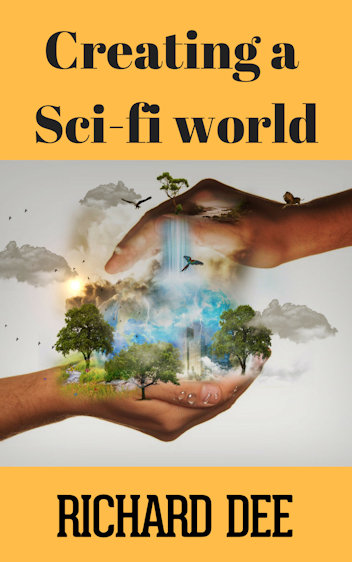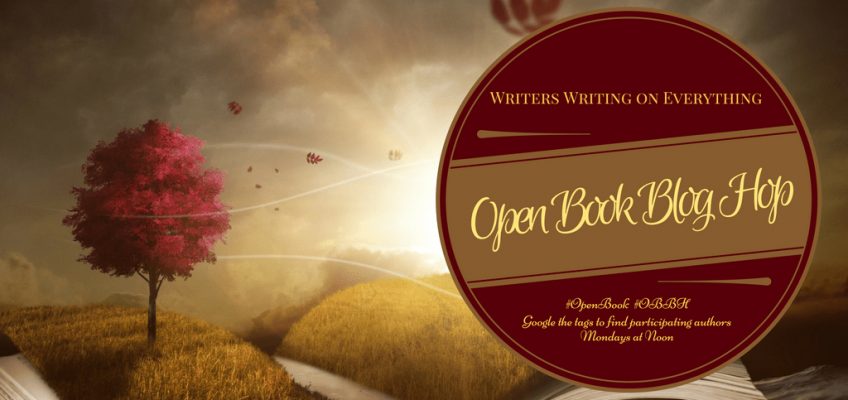Welcome back to another blog hop, with #OpenBook. Here’s this week’s prompt.
Talk about the setting of your book. Is it entirely imaginary or is it based on a real-life place?
My adventures mainly play out in a place that doesn’t exist. My characters live, love and occasionally die in a world entirely of my own construction.

It might be a planet at the far end of the Galaxy. Or a space mine orbiting Saturn. It could even be a quasi-Victorian society not unlike the England of the late 1800s.
Or something completely different to any of them.
Where and whenever it is, I have created it, dragged it into being from some part of my subconscious. I’ve given it form on the page and set my heroes loose in it. Largely, they act as if they know the place, to them it is as familiar as your own hometown.
Which is not to say that the worlds I create are unconnected to where I have been in my life. I was lucky enough to travel the world, back in the days before the internet, before instant communication and well before the homogenisation of culture that was the result of our (pre-Corona) global economy.
This experience showed me many things, all of which were filed away for future reference.
When I wrote my first novel, I managed to fall into the trap that a lot of people do.
I assumed that, because I was writing about the future, I had no need to research anything. All I had to do was make it futuristic. Of course, that’s wrong, you need to have a basis in fact before you can expand it.
That was where my past came in. I had seen many worlds, witnessed the way of life in places which at the time were as remote as another planet. There was enough there to use as a starting point. I could see how the things I saw and experienced fitted together to make a society. How, with a little tweaking, I could make them into a new world.
But the biggest revelation came when I realised how everything fitted together, how one place and another were connected, even though they were separated from each other. I saw how a world, or even a universe, could be constructed and expanded, ad-infinitum. Just by following a few basic principles.
I used these methods to create the worlds for my novels. Reviews the books got said how readers liked the way I had created the setting for my stories. Things like,
“This is a fabulous example of world building “
“There’s some fantastic world building too, Richard Dee takes the normal and the not so normal, to create the planet Ecais, it was so vivid I could almost picture it in my head.”
“The author establishes a sense of period so convincingly in the opening chapters that I felt transported to his world, mind, body, and soul. “
“The world building is original and complex, opening the reader’s imagination to the vast possibilities of life beyond our own world.”
I mentioned the comments, and my theories, at my writer’s group. Before long, with their encouragement, I was holding workshops on Sci-fi world-building at literary events. Which all seemed a little surreal.
Last year, I published my world-building workshops in an expanded form, with examples and exercises. In what I hope is a simple guide to world-building.

Do you want to write Sci-fi or Steampunk adventures?
Are you struggling with World Building?
Do you want to create a world: or even a universe, but you’re put off by all the science you think you need to know before you can start?
If the answer to any of those questions is yes, I’ve tried to simplify the process by showing you another way.
This guide is based on the World-building workshops that I hold as a member of the Exeter Authors Association. The aim is to show you an easier way of doing things, with chapters on such subjects as Location, Characters, Sidekicks and Steampunk. I’ll tell you the method that I’ve used to create several universes in the future and in an alternative present, maintaining realism without getting bogged down in the technicalities.
Creating a Sci-fi World contains exercises and suggestions, as well as examples from my novels, there are even some short stories to illustrate how my methods can be applied.
Which all goes to prove that nothing is ever wasted.
How about you, where do your literary adventures take place? Let me know in the comments, then go and check out the other great blogs in this hop.
Just follow this link.
https://fresh.inlinkz.com/p/907ab91ee4324ead900e17d2b50c50ce
![]()



Stevie Turner
Hi Richard, your travels must indeed have given you much inspiration. I expect if you’re creating a fictitious world which runs through a series of books, then the reader would recognise where your characters are if you’ve made each of those places consistent with what’s been written about them before. Sounds like a big notebook would come in handy!
Richard Dee
Yes, I have loads of notebooks. Continuity is a nightmare, it can take up as much time as research. Someone is always watching, ready to spot the glitch. Even in the fifty-third century.
phil huston
People who want to spot the glitch and make something of it in a totally fictional world where things are not as we understand them are to be roundly ignored. Even Tyson. Myth drives culture, set up your worlds and their systems and they are your own. Barbara Park once said that people who wanted to make an issue out of location or grammar in fiction weren’t worth the time. I mean how many books and tickets did those Hobbits and Hogwarts and Jedi and Captain Kirk sell? Based on salt shakers as weapons?
Interesting on the world-building seminars.
Richard Dee
Exactly. My World My rules. Asimov said; “Nothing has to be true but everything has to sound true.” As long as my fictional world is based on a fact, it’s valid. One day, somebody might just say “that Richard Dee, he was writing about this stuff five hundred years ago.”
Roberta Eaton Cheadle
When I read classic books, Richard, I am often struck by how often the authors, like H.G. Wells for example, write things that readers would tear apart in a modern book. I am a big reader and to me originality and uniqueness are what makes a good book and I don’t look for small issues to hack to death as I see a lot of writers who write book reviews do. Sometimes I am quite surprised by the pettiness of the comments in reviews of books I have read and loved. I writer is like a painter and uses words to create a visual of a place or situation. How others interpret it will depend on whether they are actively looking to criticize small points or whether they are looking to be taken on an enjoyable adventure.
Richard Dee
Very true. I think that Wells was of his time and the people who read him were a lot less likely to pick holes. Perhaps they were more accepting of flaws in what were basically good stories. These days, everyone’s a critic; with a lifetime of experience in how to do anything better. Social media gives them a platform and a gang of sycophants all too ready to wade in.
Chris L Adams
This sounds like a fantastic resource, Richard. Bravo for sharing your secrets! I just purchased a copy. World-Building is something I often struggle with, never doing it in the right amounts.
If a book was a recipe and called for 1/8 cup of World-Building, I usually tend to tentatively sprinkle a teaspoon, or liberally dump in 2-cups and end up with a disappointing result.
Richard Dee
Thanks, Chris, I hope you find it useful.
Lyndell Williams
Sci-Fi world building is hard. I have a lot of respect for writers who do it well. Great post.
Richard Dee
Thank you.